Reviews
Billy Wilder
USA, 1942
Credits
Review by Sam Bett
Posted on 04 March 2011
Source Universal DVD
Categories Brackett & Wilder
Drag classics such as Some Like it Hot, Tootsie, and Mrs. Doubtfire exemplify the Male Imposter Film, in which the main character cross-dresses as a woman to enter a group or institution he could never have accessed as a man. The films mentioned above span five decades and involve a variety of scenarios, but each centers around a man or male duo who is mostly clueless about the particulars of female behavior. These comical explorations of the complex world of womanhood have perennial comedic appeal because they play with the curiosity held by all men toward life as a woman, while also pandering to women’s eagerness to see men attempt to carry out this deceptively challenging role reversal only to blunder and fail.
While The Major and the Minor is certainly part of the Imposter Film tradition and is unarguably a study of womanhood, it involves no cross-dressing or gender imitation. Rather than disguising herself as a member of the opposite sex, Susan Applegate (played by Ginger Rogers) instead dresses up as a younger version of herself in order to qualify for a half-price one-way train ticket from New York to her native Iowa. This self-reflexive disguise is what distinguishes The Major and the Minor from other Imposter Films, almost all of which involve a character posing as something that he is not and never could be. While Susan—a sassy, jaded twenty-something fed up with city life—was as a young woman not necessarily the lollipop-sweet preteen of her disguise, her act is not a total lie. Each one of us is, after all, only a cumulative version of our past selves. Pretending to be a twelve-year-old at twenty-five is only a lie because of the experiences it eliminates.
The trouble with this fallacious reasoning is that we cannot pretend away our successive experiences, nor will we ever confront circumstances identical to any past year of our lives. Both of these truths are brusquely enunciated when Major Phillip Kirby, who takes it upon himself to watch over Su-Su after the flustered “child” seeks refuge from train personnel in his sleeper car, brings her to stay at the Wallace Military Institute, the all-boys military school where he is employed as an instructor. Su-Su spends the weekend sharing a room with teenager Lucy Hill, younger sister of the Major’s fiance Pamela. Lucy sees through Susan’s act right away but chooses not to squeal, thus giving Susan a safe-zone in which she lights her cigarettes on Lucy’s Bunsen burner and gripes about being chased by scores of lusty young cadets. Surely neither growing up in Iowa nor fast-paced city life in New York has prepared Susan for the overwhelming onslaught of clumsy testosterone she faces at Wallace. Like her ungainly peers in Some Like It Hot (with which The Major and the Minor shares director Billy Wilder), Susan soon finds herself uncomfortable in the role she has assumed, despite her credentials for playing the part.
Ginger Rogers’ star power plays an influential role in The Major and the Minor. While most famous for being Fred Astaire’s dance partner, Rogers dances only twice in the film, and only one of these occasions showcases her superlative skill with the art. Suppressing her most conspicuous talent for most of the plot, Rogers conceals what defines her most as an adult actress, and thus makes her portrayal of an undeveloped girl all the more believable. When little Su-Su Applegate, grinning, finally busts a move to lure an unsuspecting cadet away from the telephone switchboard, her womanhood bursts onscreen like a lost landmine—a latent force which we knew was hidden beneath the plot all along, but knew not where or when it would explode.
The striking effects of Rogers’ star power are compounded by the cameo appearance of Rogers’ real life mother, actress Lela Rogers, at the close of the film as Susan’s mother Mrs. Applegate, a serene and collected confectioner who we first meet picking stems off strawberries on her porch in Iowa. I speak for myself when I say that Lela Rogers’ uncanny resemblance to her daughter may trick viewers into believing that her daughter Ginger has taken on yet another age-jumping role in the film. Major Phillip, who stops unannounced in Iowa after breaking up his engagement on his way to an active duty posting on the West Coast, shows affection and attraction to all three of these apparent incarnations of Ginger Rogers, which testifies both to the beauty of the Rogers family and Major Phillip’s unshakable attraction for Susan Applegate, whether she is twelve, twenty-five, or fifty years old.
Susan Applegate’s role as female pursuer is enough to surprise modern viewers, but a stronger surprise and even shock is the unapologetic portrayal of Major Phillip’s attraction to twelve-year-old Su-Su. In one scene where he calls her into his office to lecture her on the ill intentions of teenage boys, the Major becomes visibly tense and bothered after telling Su-Su how she is sure to become a very attractive girl in a matter of years—perhaps an acceptable contemporary expression for complementing a young girl’s physical potential. The scene gets especially heated when Major Philip, visibly uncomfortable, attempts to explain the dangers of sexual attraction to Su-Su in the extreme, fatalistic terms of moths to electric light, where Su-Su is the light bulb and the aroused legion of young men at Wallace are the moths. In a gesture that precedes Lolita (at least in cinema) by twenty years, Su-Su promises the Major with quirky mock innocence that she will be “a well-behaved light bulb” from now on.
The subtle and ironic result of Susan Applegate’s persistent juvenile role-playing is that Major Phillip himself begins to act like a young boy. When we first meet him at night in his sleeper car, he speaks with a nearly regal paternal flair, but after only a weekend of Su-Su’s acquaintance he finds himself suddenly nervous in her presence and unable to comfortably express himself, despite standing as an obvious authority to her and nearly everyone around him. This leveling effect is perhaps why his attraction to Su-Su, which lasts until she finally reveals her true age and identity, never seems salacious or unnerving. Somehow we never feel in the presence of a pedophile, though we are sure that Major Philip is unaware that Su-Su is, in fact, well past being the “minor” referenced in the title. Through her relentless subterfuge, Susan stirs up the student body and faculty alike and arrests control over the entire institute. The effect is temporary, but it lasts long enough to pull Major Phillip down from his higher office and make this unlikely couple seem nothing but natural.
More Brackett & Wilder
-
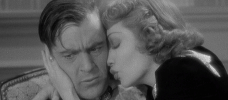
Bluebeard’s Eighth Wife
1938 -
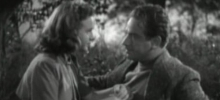
That Certain Age
1938 -

Midnight
1939 -
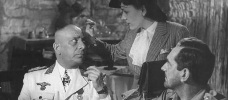
Five Graves to Cairo
1943 -
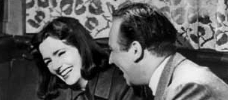
Ninotchka
1939 -
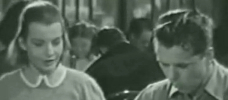
What a Life
1939 -
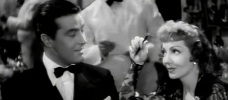
Arise My Love
1940 -
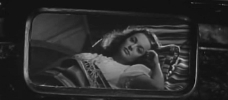
Hold Back the Dawn
1941 -
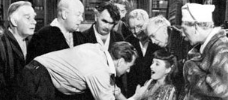
Ball of Fire
1941 -
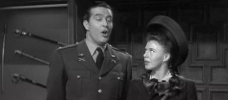
The Major and the Minor
1942 -
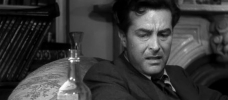
The Lost Weekend
1945 -
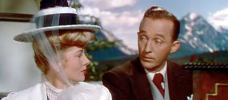
The Emperor Waltz
1948 -
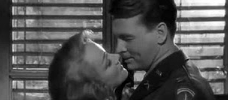
A Foreign Affair
1948 -
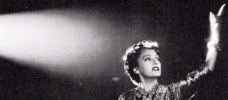
Sunset Boulevard
1950
We don’t do comments anymore, but you may contact us here or find us on Twitter or Facebook.



